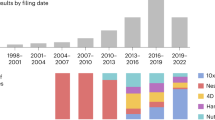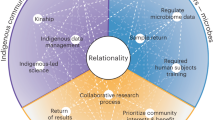Abstract
Human–microbiome interactions have been associated with evolutionary, cultural and environmental processes. With clinical applications of microbiome research now feasible, it is crucial that the science conducted, particularly among Indigenous communities, adheres to principles of inclusion. This necessitates a transdisciplinary dialogue to decide how biological samples are collected and who benefits from the research and any derived products. As a group of scholars working at the interface of biological and social science, we offer a candid discussion of the lessons learned from our own research and introduce one approach to carry out ethical microbiome research with Indigenous communities.
This is a preview of subscription content, access via your institution
Access options
Access Nature and 54 other Nature Portfolio journals
Get Nature+, our best-value online-access subscription
$29.99 / 30 days
cancel any time
Subscribe to this journal
Receive 12 digital issues and online access to articles
$119.00 per year
only $9.92 per issue
Buy this article
- Purchase on Springer Link
- Instant access to full article PDF
Prices may be subject to local taxes which are calculated during checkout
Similar content being viewed by others
References
Lewis, C., Obregon-Tito, A., Tito, R., Foster, M. & Spicer, P. The Human Microbiome Project: lessons from human genomics. Trends Microbiol. 20, 1–4 (2012).
Claw, K. et al. A framework for enhancing ethical genomic research with Indigenous communities. Nat. Commun. 9, 2957 (2018).
Reardon, J. Race to the Finish (Princeton University Press, 2009).
Tsosie, K., Yracheta, J., Kolopenuk, J. & Smith, R. Indigenous data sovereignties and data sharing in biological anthropology. Am. J. Phys. Anthropol. 174, 183–186 (2021).
Tsosie, K., Yracheta, J., Kolopenuk, J. & Geary, J. We have ‘gifted’ enough: Indigenous genomic data sovereignty in precision medicine. Am. J. Bioeth. 21, 72–75 (2021).
Haring, R. C. et al. Empowering equitable data use partnerships and Indigenous data sovereignties mid pandemic genomics. Front. Public Health 9, 742467 (2021).
Asad, T. in The Politics of Anthropology: from Colonialism and Sexism Toward a View from Below (eds Huizer, G. & Mannheim, B.) 85–96 (Ithica Press, 1973).
Deloria, V. Custer Died for Your Sins: an Indian Manifesto (University of Oklahoma Press, 1969).
Hymes, D. Reinventing Anthropology (Pantheon, 1974).
Trouillot, M. R. Global Transformations (Palgrave Macmillan, 2003).
Broesch, T. et al. Navigating cross-cultural research: methodological and ethical considerations. Proc. R. Soc. B https://doi.org/10.1098/rspb.2020.1245 (2020).
Urassa, M., Lawson, D., Wamoyi, J., Gurmu, E. & Gibson, M. Cross-cultural research must prioritize equitable collaboration. Nat. Hum. Behav. 5, 668–671 (2021).
Blanchard, J. et al. Power sharing, capacity building, and evolving roles in ELSI: The Center for the Ethics of Indigenous Genomic Research. Collaborations 3, 18 (2020).
Hudson, M. et al. in Ethics in Indigenous Research, Past Experiences—Future Challenges (Vaartoe Centre for Sami Research, 2016).
Schroeder, D., Chatfield, K., Singh, M., Chennells, R. & Herissone-Kelly, P. Equitable Research Partnerships: a Global Code of Conduct to Counter Ethics Dumping (Springer Nature, 2019); https://doi.org/10.1007/978-3-030-15745-6
Jobson, R. The case for letting anthropology burn: sociocultural anthropology in 2019. Am. Anthropologist 122, 259–271 (2020).
Kowal, E. Orphan DNA: Indigenous samples, ethical biovalue and postcolonial science. Soc. Stud. Sci. 43, 577–597 (2013).
Smith, L. T. Decolonizing Methodologies: Research and Indigenous Peoples (Bloomsbury Publishing, 2021).
Viswanathan, M. et al. Community‐Based Participatory Research: Assessing the Evidence: Summary (AHRQ, 2004).
Caniglia, G. et al. A pluralistic and integrated approach to action-oriented knowledge for sustainability. Nat. Sustain. 4, 93–100 (2021).
Coombes, B., Johnson, J. & Howitt, R. Indigenous geographies III: methodological innovation and the unsettling of participatory research. Prog. Hum. Geogr. 38, 845–854 (2014).
Sharp, R. & Foster, M. Community involvement in the ethical review of genetic research: lessons from American Indian and Alaska Native populations. Environ. Health Perspect. 110, 145–148 (2002).
Wallerstein, N. & Duran, B. in Community-Based Participatory Research for Health: Advancing Social and Health Equity (eds Wallerstein, N., Duran, B., Oetzel, J. G. & Minkler, M.) 17–29 (John Wiley and Sons, 2017).
Obregon-Tito, A. et al. Subsistence strategies in traditional societies distinguish gut microbiomes. Nat. Commun. 6, 6505 (2015).
Mandava, A., Pace, C., Campbell, B., Emanuel, E. & Grady, C. The quality of informed consent: mapping the landscape. A review of empirical data from developing and developed countries. J. Med. Ethics 38, 356–365 (2012).
Afolabi, M. O. et al. Informed consent comprehension in African research settings. Tropical Med. Int. Health 19, 625–642 (2014).
Edwards, T., Cadigan, R., Evans, J. & Henderson, G. Biobanks containing clinical specimens: defining characteristics, policies, and practices. Clin. Biochem. 47, 245–251 (2014).
Grady, C. et al. Broad consent for research with biological samples: workshop conclusions. Am. J. Bioeth. 15, 34–42 (2015).
Lewis, C., McCall, L.-I., Sharp, R. & Spicer, P. Ethical priority of the most actionable system of biomolecules: the metabolome. Am. J. Phys. Anthropol. 171, 177–181 (2020).
McCarty, C., Chapman-Stone, D., Derfus, T., Giampietro, P. & Fost, N. Community consultation and communication for a population-based DNA biobank: the Marshfield clinic personalized medicine research project. Am. J. Med. Genet. A 146A, 3026–3033 (2008).
Tsosie, K. S., Yracheta, J. M. & Dickenson, D. Overvaluing individual consent ignores risks to tribal participants. Nat. Rev. Genet. 20, 497–498 (2019).
Chavis, D. M., Stucky, P. E. & Wandersman, A. Returning basic research to the community: a relationship between scientist and citizen. Am. Psychologist 38, 424 (1983).
Godoy, R., Reyes-García, V., Byron, E., Leonard, W. & Vadez, V. The effect of market economies on the well-being of indigenous peoples and on their use of renewable natural resources. Annu. Rev. Anthropol. 34, 121–138 (2005).
Reardon, J. & TallBear, K. ‘Your DNA is our history’ genomics, anthropology, and the construction of whiteness as property. Curr. Anthropol. 53, 233–245 (2012).
Schnorr, S. et al. Gut microbiome of the Hadza hunter-gatherers. Nat. Commun. 5, 3654 (2014).
O’Doherty, K. C. et al. Opinion: conservation and stewardship of the human microbiome. Proc. Natl Acad. Sci. USA 111, 14312–14313 (2014).
Dubois, G., Girard, C., Lapointe, F.-J. & Shapiro, J. The Inuit gut microbiome is dynamic over time and shaped by traditional foods. Microbiome 5, 151 (2017).
Sprockett, D. et al. Microbiota assembly, structure, and dynamics among Tsimane horticulturalists of the Bolivian Amazon. Nat. Commun. 11, 3772 (2020).
Stagaman, K. et al. Market integration predicts human gut microbiome attributes across a gradient of economic development. MSystems 3, 00122-17 (2018).
Conteville, L. C., Oliveira-Ferreira, J. & Vicente, A. C. P. Gut microbiome biomarkers and functional diversity within an Amazonian semi-nomadic hunter-gatherer group. Front. Microbiol. 30, 1743 (2019).
Fischer, M. In the science zone: the Yanomami and the fight for representation. Anthropol. Today 17, 9–14 (2001).
Goncalves Martin, J. Opening a path with papers: Yanomami health agents and their use of medical documents. J. Lat. Am. Caribb. Anthropol. 21, 434–456 (2016).
Redford, K. & Maclean Stearman, A. Forest-dwelling native Amazonians and the conservation of biodiversity: interests in common or in collision? Conserv. Biol. 7, 248–255 (1993).
Vega, C., Orellana, J., Oliveira, M., Hacon, S. & Basta, P. Human mercury exposure in Yanomami indigenous villages from the Brazilian Amazon. Int. J. Environ. Res. Public Health 15, 1051 (2018).
Clemente, J. et al. The microbiome of uncontacted Amerindians. Sci. Adv. 1, 1500183 (2015).
Gibbons, A. Hadza on the brink. Science 360, 700–704 (2018).
Pollom, T. R., Herlosky, K. N., Mabulla, I. A. & Crittenden, A. N. Changes in juvenile foraging behavior among the Hadza of Tanzania during early transition to a mixed-subsistence economy. Hum. Nat. 31, 123–140 (2020).
Crittenden, A. N. et al. Harm avoidance and mobility during middle childhood and adolescence among Hadza foragers. Hum. Nat. 32, 150–176 (2021).
Wynberg, R. & Chennells, R. in Indigenous Peoples, Consent and Benefit Sharing (eds Wynberg, R., Schroeder, D. & Chennells, R.) 89–124 (Springer, 2009); https://doi.org/10.1007/978-90-481-3123-5_6
Rubel, M. et al. Lifestyle and the presence of helminths is associated with gut microbiome composition in Cameroonians. Genome Biol. 21, 122 (2020).
Sankaranarayanan, K. et al. Gut microbiome diversity among Cheyenne and Arapaho individuals from Western Oklahoma. Curr. Biol. 25, 3161–3169 (2015).
Rogers, G. B., Ward, J., Brown, A. & Wesselingh, S. L. Inclusivity and equity in human microbiome research. Lancet 39, 728–729 (2019).
Ambler, J. et al. Including digital sequence data in the Nagoya Protocol can promote data sharing. Trends Biotechnol. 39, 116–125 (2021).
Morgera, E. The need for an international legal concept of fair and equitable benefit sharing. Eur. J. Int. Law 27, 353–383 (2016).
Bissell, W. Engaging colonial nostalgia. Cultural Anthropol. 20, 215–248 (2005).
Crittenden, A. in The Secret Lives of Anthropologists (ed. Hewlett, B. L.) 299–321 (Routledge, 2019).
Redford, K. H. The ecologically noble savage. Cultural Survival Q 15, 46–48 (1991).
Carmody, R. N., Sarkar, A. & Reese, A. T. Gut microbiota through an evolutionary lens. Science 372, 462–463 (2021).
Belmont Report: Ethical Principles and Guidelines for the Protection of Human Subjects of Research (National Commission for the Protection of Human Subjects of Biomedical and Behavioral Research, 1979).
McClain, V. W. Patents on life: a brief view of human milk component patenting. World Nutr. 9, 57–69 (2018).
Hill, J. H. ‘Expert rhetorics’ in advocacy for endangered languages: who is listening, and what do they hear? J. Linguistic Anthropol. 12, 119–133 (2002).
Acknowledgements
This work was funded by a National Science Foundation SBE Postdoctoral Research Fellowship (award no. 1810060), the European Union’s Horizon 2020 research and innovation programme under the Marie Skłodowska–Curie grant agreement no. 847693, the National Human Genome Research Institute and the Center for the Ethics of Indigenous Genomics Research (grant no. RM1HG009042), and the Wenner Gren Foundation for Anthropological Research. The authors thank those who evaluated previous versions of the manuscript and provided critical comments, provided opportunities to present early drafts and fostered insightful discussions throughout the process of constructing this work: H. Bachner, H. C. Barrett, D. Benyshek, D. Berry, G. Caniglia, A. Gomez, B. Hewlett, R. Hitchcock, C. Hofman, D. Shopo, J. Indaya, A. Laciny, W. Lukasi, I. Mabulla, R. Matiyas, S. Strum and D. Western.
Author information
Authors and Affiliations
Corresponding author
Ethics declarations
Competing interests
S.M.M. and A.N.C. declare non-financial competing interests as unpaid board members for a 501c(3) educational non-profit organization that works with the Hadzabe community, the Olanakwe Community Fund (www.olanakwe.org). The work of the mutual aid organization is unrelated to biological research. S.L.S. and J.R.L. declare no competing interests.
Additional information
Publisher’s note Springer Nature remains neutral with regard to jurisdictional claims in published maps and institutional affiliations.
Rights and permissions
About this article
Cite this article
Mangola, S.M., Lund, J.R., Schnorr, S.L. et al. Ethical microbiome research with Indigenous communities. Nat Microbiol 7, 749–756 (2022). https://doi.org/10.1038/s41564-022-01116-w
Received:
Accepted:
Published:
Issue Date:
DOI: https://doi.org/10.1038/s41564-022-01116-w
This article is cited by
-
Can societal and ethical implications of precision microbiome engineering be applied to the built environment? A systematic review of the literature
Environment Systems and Decisions (2024)
-
A relational framework for microbiome research with Indigenous communities
Nature Microbiology (2023)
-
Microbiome ownership for Indigenous peoples
Nature Microbiology (2023)
-
Challenges and opportunities in sharing microbiome data and analyses
Nature Microbiology (2023)
-
Microbiome ethics, guiding principles for microbiome research, use and knowledge management
Environmental Microbiome (2022)



